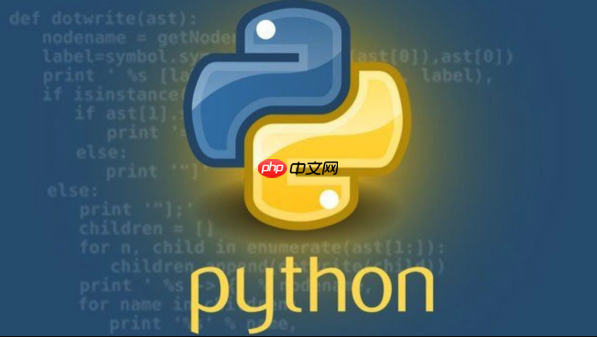如何使用functools.singledispatch处理不同异常类型?1. 使用@functools.singledispatch装饰主异常处理函数,定义默认处理逻辑;2. 通过@register方法为每个具体异常类型(如valueerror、typeerror、filenotfounderror)注册专属处理函数;3. 在异常发生时自动匹配最具体的处理函数,支持继承关系的异常类型优先调用子类处理逻辑;4. 可结合Logging模块按异常类型进行不同级别的日志记录,提升代码可维护性与可读性。

functools.singledispatch 允许你基于函数的第一个参数的类型,来定义不同的函数实现。这可以用来为不同的异常类型提供定制的处理逻辑,让你的代码更具可读性和可维护性。

处理不同异常类型,就是针对不同异常的“形态”做出反应,singledispatch正好擅长这个。

解决方案:
import functools @functools.singledispatch def handle_exception(exception): """ 默认的异常处理逻辑。 """ print(f"Unhandled exception: {type(exception).__name__} - {exception}") @handle_exception.register def _(exception: ValueError): """ 处理 ValueError 异常的逻辑。 """ print(f"ValueError occurred: {exception}. Let's try something else...") # 在这里添加特定于 ValueError 的处理代码 @handle_exception.register def _(exception: TypeError): """ 处理 TypeError 异常的逻辑。 """ print(f"TypeError occurred: {exception}. Maybe check your types?") # 在这里添加特定于 TypeError 的处理代码 @handle_exception.register def _(exception: FileNotFoundError): """ 处理 FileNotFoundError 异常的逻辑。 """ print(f"FileNotFoundError: {exception}. Double check that path!") # 在这里添加特定于 FileNotFoundError 的处理代码 # 示例用法 try: raise ValueError("Invalid value") except Exception as e: handle_exception(e) try: raise TypeError("Incorrect type") except Exception as e: handle_exception(e) try: raise FileNotFoundError("File not found") except Exception as e: handle_exception(e) try: raise Exception("Generic exception") except Exception as e: handle_exception(e)
这种方式避免了大量的 if/elif/else 结构,代码更清晰。

如何处理继承关系的异常类型?
如果你的异常类型存在继承关系,singledispatch 会选择最具体的注册函数。例如,如果 MyCustomError 继承自 ValueError,并且你同时注册了 ValueError 和 MyCustomError 的处理函数,那么当抛出 MyCustomError 异常时,会调用 MyCustomError 的处理函数。如果没有 MyCustomError 的处理函数,则会调用 ValueError 的处理函数。
class MyCustomError(ValueError): pass @handle_exception.register def _(exception: MyCustomError): print("Handling MyCustomError specifically!") try: raise MyCustomError("This is a custom error") except Exception as e: handle_exception(e)
这种行为是符合预期的,但需要注意,确保你的异常处理逻辑覆盖了所有可能的情况。
使用 singledispatch 处理异常的性能考量
singledispatch 在首次调用时会进行一些类型检查和函数注册,这可能会带来一些性能开销。但是,一旦注册完成,后续的调用将会非常快,因为它使用了缓存机制。
如果你的异常处理逻辑需要非常高的性能,可以考虑使用其他方法,例如直接使用 if/elif/else 结构。但是,对于大多数应用场景来说,singledispatch 的性能足够好,并且可以带来更好的代码可读性和可维护性。
更进一步,可以考虑结合日志记录。
import logging logging.basicConfig(level=logging.ERROR) # 设置日志级别 @functools.singledispatch def handle_exception(exception): logging.error(f"Unhandled exception: {type(exception).__name__} - {exception}") @handle_exception.register def _(exception: ValueError): logging.warning(f"ValueError occurred: {exception}. Trying something else...") # 特定于 ValueError 的处理代码 @handle_exception.register def _(exception: FileNotFoundError): logging.critical(f"FileNotFoundError: {exception}. Double check that path!") # 特定于 FileNotFoundError 的处理代码
这样,未处理的异常会被记录为错误,ValueError 记录为警告,FileNotFoundError 记录为严重错误,可以根据异常的严重程度进行不同的日志记录。



















